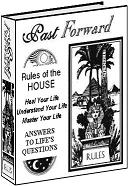|
Rules #22a: Living the Way of Dharma in Coworkership with God
Karma is designed to bring us all onto the way of Dharma, the path of CoWorkership with God. The "pain and suffering" of karma are designed to teach us how to live within the laws of karma. Learning to live a karma free life ingrains in us a deep and abiding respect for the law so that we always stay within it's bounds. For only by staying inside it's bounds can we become free of it. Once we can handle this freedom responsibly, do we get off the road of karma and move onto the path of Dharma. The way of Dharma is the way of CoWorkership
with God in loving service to and respect for all life.
Here is how it unfolds: 1> DHARMA MEANS ACTING FROM SOUL CONSCIOUSNESS Similar to the Buddhist principle of Right Concentration, we enter the way of Dharma by becoming fully in balance with our Soul Body. This happens when an individual becomes completely absorbed in the NOW, accepting the complete perfection of each moment. 2> DHARMA MEANS ACTING FROM SOUL'S PURPOSE Similar to the Buddhist truth regarding Suffering, we enter the way of Dharma by becoming fully in balance with our Etheric (Intuitive) Body. Suffering comes from and individual's refusal to embrace their role in the Divine Plan. Suffering ends when the individual accepts that it is "Thy will" and "not my will" that must be done. 3> DHARMA MEANS BECOMING ONE WITH LIFE Similar to the Buddhist truth regarding Attachment, we enter the way of Dharma by becoming fully in balance with our Mental (Thought) Body. Clinging to base desires, prejudices, familiar ways of life, and other such attachments keeps us small and bound by karmic chains to the wheel of rebirth. It is only by embracing the process, flow, and perfection of life that we break the attachments which cause our pain and keep us from becoming a fully realized co-worker with God. 4> DHARMA MEANS CREATING HARMONY FOR OTHERS Similar to the Buddhist truth regarding Detachment, we enter the way of Dharma by becoming fully in balance with our Astral (Emotional) Body. Detachment means letting go and letting God move through our life so that we can accomplish his work in the world. Often this requires little more than becoming a center of peace and harmony which others rely on and draw comfort from. 5> DHARMA MEANS HONORING THE DIVINITY OF ALL Similar to the Buddhist truth regarding Evolution, we enter the way of Dharma by becoming fully in balance with our Physical (Matter) Body. Those on the path of Dharma recognize that how they treat their body mirrors their treatment of all life. The physical body is a gift given by God to accomplish Soul's purpose in this life - by honoring it, they honor their Creator. As they honor the body, they connect with and honor the divinity and the perfection of all God's creations. 6> DHARMA MEANS ACTING FOR THE HIGHEST GOOD OF ALL Similar to the Buddhist principle of Right Understanding/Right View, those on the path of Dharma have opened their Crown Chakra to express their Divine Essence. Acting for the highest good of all frees one of expectations. They do not have hopes about how things should be or fears about how things might be. They accept things as they are: trusting that "all things work together for good for those that love God" and they will unfold for the highest good of all. 7> DHARMA MEANS TRUSTING SUPPORT OF HIGHEST GOOD Similar to the Buddhist principle of Right Thought/Right Intention, those on the path of Dharma have opened their Third Eye Chakra to receive all they need to know to carry out their Soul's purpose. Abandoning expectations, hopes, and fears, they are free to work with what is. This brings a purity to their thoughts and actions that attracts support from the universe needed to accomplish God's work in the world whether it be ideas, people, money, or other resources. 8> DHARMA MEANS SPEAKING ONLY WHAT IS TRUE Similar to the Buddhist principle of Right Speech, those on the path of Dharma have opened their Throat Chakra to communicate only what is truest and best from their spirit. Since their intentions are pure, they will naturally speak from the heart. This heart centered speech always contains the three essential karma-free components: it is true, it is necessary, and it is kind. Notice that these are also the essential qualities of all Divine Guidance "spoken" to the clairaudient. 9> DHARMA MEANS ACTING WITH LOVE FOR ALL LIFE Similar to the Buddhist principle of Right Action/Right Discipline, those on the path of Dharma have opened their Heart Chakra to their greatest joy because they have learned to love all as Soul and to see God in everything. Their love for all life embraces everything and everyone: from the mass murderer to the saint. Those on the path of Dharma are able to love and cherish all because all are loved and cherished by God - equally - for all are His much loved children. 10> DHARMA MEANS ALLOWING LIFE TO FLOW IN JOY Similar to the Buddhist principle of Right Livelihood, those on the path of Dharma have opened their Solar Plexus Chakra to the full totality of who they are. Service is the deepest expression of love for as we serve we put the needs of others ahead of our own. Dharmic work is that which empowers and uplifts others as it feeds and nurtures us. All work can be dharmic if we form a simple relationship with it by to performing it properly with loving attention to detail. 11> DHARMA MEANS BEING A COWORKER WITH GOD Similar to the Buddhist principle of Right Effort, those on the path of Dharma have opened their Sacral Chakra to connect with their personal power as a CoWorker with God. Power is a tool: it is neither good nor bad in and of itself. When one uses their personal power to achieve the loving purposes of Dharma, one always works with it gently, without any aggression or manipulation. 12> DHARMA MEANS LIVING LOVE IN EVERY MOMENT Similar to the Buddhist principle of Right Mindfulness, those on the path of Dharma have opened their Root Chakra to the Earthly tools of "sex, money, and power" in a balanced, helpful way. They are mindful of the tiniest details of their experience - the way they perform their job, spend their money, and treat their love partner, family, friends, and coworkers - at every moment of every day. Credits: adapted from the Buddhist Principles of the Eightfold Path and the Four Noble Truths and from the "Mahanta Transcripts" by Sri Harold Klemp. |
KEYS: ////F-R-E-E: SERVICES: BOOKS: TOOLS: CONTACT: |
|||||
|
Home | Instant Info | Past Life Profile | Catalog | Email
Our Services
Terms of Service
Coaching Agreement
Earnings-Income Disclaimer
Copyright © 2000-2023, Ellen A Mogensen,
Past & Now Forward Holistic Counseling, |





 From Karma to Dharma...
From Karma to Dharma...
